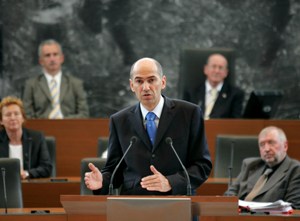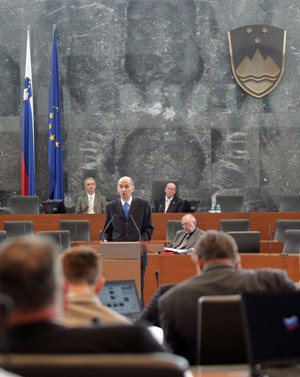"We used our presidency as an opportunity, and not just as a duty or obligation imposed upon every Member State," said Prime Minister Janez Janša during his presentation of the report on Slovenia's Presidency of the European Union at the 39th extraordinary session of the National Assembly. "The extra value Slovenia has gained from it cannot be expressed in numbers. One thing is certain: the experience and knowledge acquired by about a thousand civil servants working on this project will provide solid ground for our future work."

(Photo: Kristina Kosec/Bobo)
According to PM Janez Janša, Slovenia now knows the way individual Member States function; it knows their problems, their advantages and their good practices, which could be transferred to Slovenian plans for development. He sees this as a great asset. In taking on the presidency, Slovenia embarked on a demanding project, yet carried it out successfully, despite having a tighter budget to work with than other Member States. Apart from reaching the goals it set as priorities, Slovenia managed to deal efficiently with a number of unpredictable events and therefore proved there is no reason why a small Member State shouldn't be in charge of the European Union.
Speaking about the five priorities set out by the Slovenian Government, Prime Minister Janša drew attention to successfully encouraging the Lisbon Treaty ratification by Member States, launching the new cycle of the Lisbon Strategy, reaching agreement on the directives on working time and temporary workers, resolving climate and energy-related issues, and reaching agreement on the third legislative package concerning full liberalisation of the internal electricity and gas market. The Slovenian Presidency was also successful in answering questions connected to the Western Balkans and in taking concrete steps towards multicultural dialogue, for example by founding the Euro-Mediterranean University in Portorož.
While in charge of the EU Council, Slovenia managed to steer between such unpredictable events as the rise of food and oil prices, Kosovo's declaration of independence and the "No" vote in the Irish referendum, also making many advances in setting up the European global navigation system Galileo. For Mr Janša, however, one of the least expected achievements was clinching the deal between the European Union and the Russian Federation to start negotiations on a new cooperation agreement.

(Photo: Kristina Kosec/Bobo)
During the National Assembly session, the PM also revealed a draft declaration on Slovenia's policy orientations in EU institutions from 1 July 2008 to December 2009. He said it was crucial to confirm this document if Slovenia is to have a clear, transparent and unified policy regarding European affairs.
Slovenia will be actively involved mainly in the three priority areas outlined by the second Presidency Trio of France, the Czech Republic and Sweden for the next 18 months, said the PM. These include developing the EU's institutions, implementing measures aimed at ensuring the long-term quality of life and security of its citizens, and strengthening the role of the EU in the globalised world. These issues were also high on the agenda during Slovenia's Presidency of the EU Council in the first six months this year, but the country now has a different role to play, allowing it to focus on its own interests.
Prime Minister Janša stressed that Slovenia will continue to support Lisbon Treaty ratification, the EU's enlargement policy, review of the Common Agricultural Policy, Lisbon Strategy implementation, promotion of innovation and creativity, prompt construction of the internal market with free movement of services, reform of the social agenda, and adoption of the energy and climate change package. Further, Mr Janša said, "We are still very much interested in the satellite navigation project Galileo. Our activities aimed at winning the headquarters of the Galileo supervisory authority are in full swing and are coordinated by a special working group."